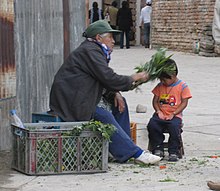Folk healer

A folk healer is an unlicensed person who practices the art of healing using traditional practices, herbal remedies and the power of suggestion.
The healer may be a highly trained person who pursues their specialties, learning by study, observation and imitation. In some cultures a healer might be considered to be a person who has inherited the "gift" of healing from his or her parent. The ability to set bones or the power to stop bleeding may be thought of as hereditary powers.
Granny women
Granny women are purported to be healers and midwives in Southern Appalachia and the Ozarks, claimed by a few academics as practicing from the 1880s to the 1930s. They are theorized to be usually elder women in the community and may have been the only practitioners of health care in the poor rural areas of Southern Appalachia. They are often thought not to have expected or received payment, and were respected as authorities on herbal healing and childbirth. They are mentioned by John C. Campbell in The Southern Highlander and His Homeland:[1]
There is something magnificent in many of the older women with their stern theology – part mysticism, part fatalism – and their deep understanding of life. ..."Granny" – and one may be a grandmother young in the mountains – if she has survived the labor and tribulation of her younger days, has gained a freedom and a place of irresponsible authority in the home hardly rivaled by the men of the family. ...Though superstitious she has a fund of common sense, and she is a shrewd judge of character. In sickness she is the first to be consulted, for she is generally something of an herb doctor, and her advice is sought by the young people of half the countryside in all things from a love affair to putting a new web in the loom.[1]
Alleged cancer healing
Folk medicine in Appalachia has historically included nontraditional methods of treating skin cancer. In the early 1900s, for example, a Virginian man named Thomas Rauleigh Carter became renowned for his prowess in healing skin cancer in addition to his midwifery.[2] Although he was a minister, his treatments focused on the application or ingestion of specific herbs and plants rather than on faith in a higher power. Carter kept his formula secret, even from his immediate family, and treated many people for lesions and skin conditions believed to be cancerous.[2]
See also
- Cunning folk
- White witch
- Folk medicine
- Faith healing
- Home remedy
- Alternative medicine
- Kitchen witch
- Witcher (mythology)
- Curandero
- Traditional healers of Southern Africa
- Medicine man
- Witch doctor
References
- ^ a b John C. Campbell, The Southern Highlander and his Homeland, Russell Sage foundation, 1921, pg. 140. https://archive.org/details/southernhighland00camp
- ^ a b Cavender, Anthony (1996). "Local unorthodox healers of cancer in the Appalachian South". Journal of Community Health. 21 (5): 359–374. doi:10.1007/bf01702788. ISSN 0094-5145.
Sources
- Keith Thomas, Religion and the Decline of Magic (1971), p. 534.
- Ryan Stark, Rhetoric, Science, and Magic in Seventeenth-Century England (2009), 123-27.
- Anthony P. Cavender. Folk Medicine in Southern Appalachia (2003).
